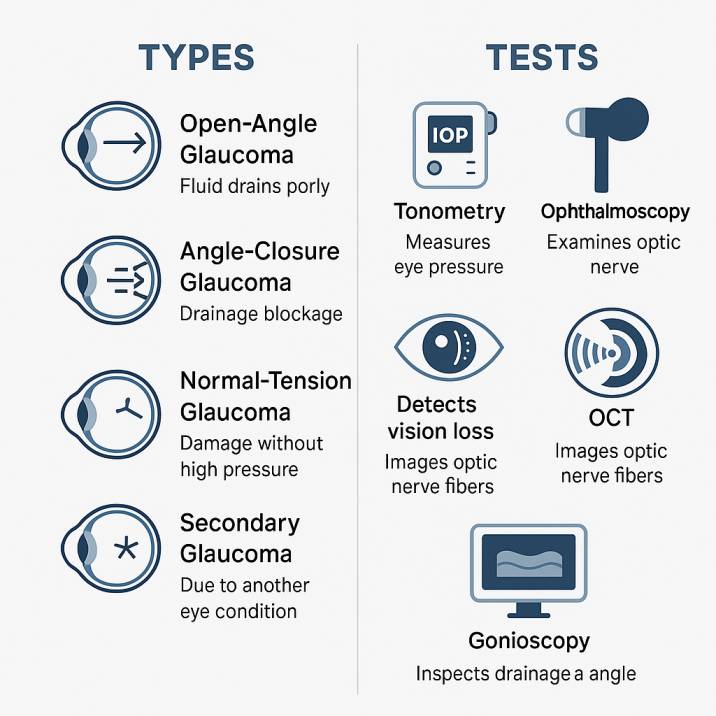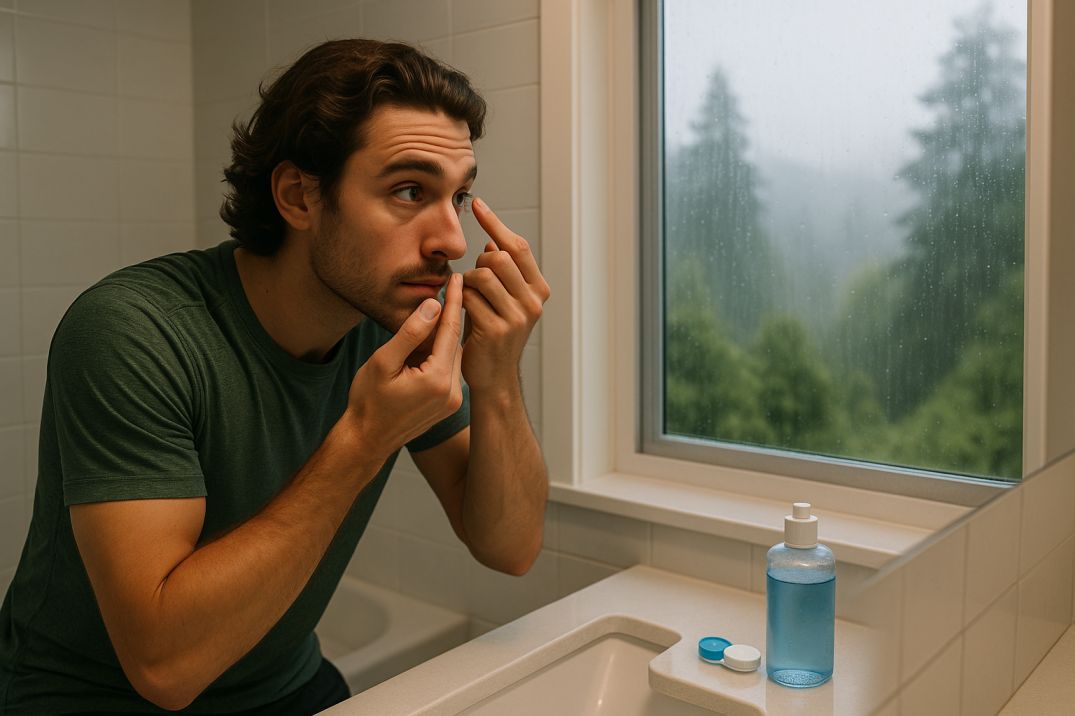Glaucoma in Seattle: Causes, Signs & New Treatments
Glaucoma is a leading cause of permanent vision loss in Seattle—often without warning. Learn how to detect it early, reduce your risk, and explore breakthrough treatment options.
Key Takeaways: Glaucoma Detection & Care in Seattle
-
Glaucoma can progress silently—many Seattle patients lose vision without early symptoms. Regular eye exams are essential for early diagnosis and prevention.
-
You don’t need high eye pressure to have glaucoma—normal-tension glaucoma still damages the optic nerve, especially in high-risk groups.
-
Modern diagnostics detect damage early—Cannon EyeCare uses OCT, visual field mapping, and gonioscopy to identify glaucoma before vision loss occurs.
-
Treatment is highly personalized—Seattle patients benefit from eye drops, laser therapies, MIGS procedures, and new drug implants like iDose TR™.
-
2025 breakthroughs are here—Cannon EyeCare offers AI-powered home monitoring, neuroprotective trials, and longer-lasting treatments to reduce burden.
-
Daily habits make a difference—exercise, leafy greens, medication adherence, and blood pressure control all help protect vision.
-
Support is available—Seattle’s glaucoma patients can access adaptive tools, support groups, and local rehab services to maintain independence and well-being.
What Is Glaucoma? Seattle Eye Experts Explain Causes, Types & Risks
Glaucoma is a progressive eye disease that damages the optic nerve, often linked to high intraocular pressure (IOP). At Cannon EyeCare in Seattle, WA, we emphasize that elevated pressure isn’t the only cause—genetics and other critical factors also contribute.
Major glaucoma types we diagnose and treat:
-
Primary Open-Angle Glaucoma: Seattle’s most common type; fluid drains poorly, gradually raising IOP.
-
Angle-Closure Glaucoma: Drainage blockage causes sudden pressure spikes and acute symptoms.
-
Normal-Tension Glaucoma: Optic nerve damage occurs despite normal eye pressure.
-
Secondary/Post-Traumatic Glaucoma: Develops after eye injuries, diseases, or medication use.
As a leading cause of irreversible blindness, glaucoma steals peripheral vision first, frequently with no warning signs until advanced stages. Early detection through comprehensive eye exams at our Seattle clinic is vital to protect your sight.
Early Glaucoma Signs, Risk Factors & Urgent Symptoms: Seattle Insights
Recognizing glaucoma’s subtle early signs is critical for Seattle residents. While some types progress silently, key symptoms include:
-
Gradual peripheral vision loss (often unnoticed initially)
-
Sudden eye pain or pressure (common in angle-closure glaucoma)
-
Blurred vision or light halos
Are You High-Risk? Key Factors We Screen for at Cannon EyeCare:
-
Age 60+ (risk increases significantly after 60)
-
Family history of glaucoma (genetic predisposition)
-
Ethnic heritage: Higher prevalence in African American, Hispanic, and Asian populations
-
Thinner corneas (measured during exams)
-
Systemic conditions: Diabetes, hypertension, or long-term steroid use
Glaucoma Diagnosis in Seattle: Essential Tests at Cannon EyeCare
Early detection is your strongest defense against glaucoma. At our Seattle clinics, a comprehensive glaucoma evaluation includes these painless, advanced tests:
-
Tonometry: Precisely measures your eye pressure (IOP) with a gentle puff of air or contact probe.
-
Ophthalmoscopy: Our specialists magnify and examine your optic nerve health for subtle damage.
-
Visual Field Test: Maps peripheral vision to detect blind spots—critical for catching silent glaucoma.
-
OCT (Optical Coherence Tomography): Uses light waves to create 3D images of optic nerve fibers, revealing early damage.
-
Gonioscopy: A specialized lens inspects your eye’s drainage angle anatomy to determine glaucoma type.
2025 Glaucoma Treatment Options in Seattle: Advanced Care at Cannon EyeCare
Managing glaucoma effectively requires personalized solutions. At our Seattle clinics, we tailor treatments to your specific type, severity, and lifestyle:
1. Medication Management
-
Prescription Eye Drops: First-line treatment to lower IOP. Consistent use is vital. We prescribe:
• Prostaglandin analogs (once daily)
• Beta blockers
• Alpha agonists
• Carbonic anhydrase inhibitors -
Oral Medications: Used when drops alone are insufficient
2. Laser & Surgical Therapies
-
SLT (Selective Laser Trabeculoplasty): Non-invasive 5-minute procedure enhancing drainage. Covered by most Seattle insurance plans.
-
MIGS (Minimally Invasive Glaucoma Surgery): Tiny stents (iStent®, Hydrus®) implanted during cataract surgery. Quick recovery, ideal for mild-moderate cases.
-
Conventional Surgery: Trabeculectomy/tube shunts for advanced glaucoma.
3. 2025 Breakthroughs We Offer
-
iDose TR™ Sustained-Release Implants: Replace daily drops for 1-3 years.
-
AI Home Monitoring: FDA-cleared apps track vision changes between visits.
-
Neuroprotective Therapies (Clinical Trials): Medications shielding optic nerves from damage.
Take Control: Glaucoma Management Strategies from Seattle’s Trusted Experts
Proactive management preserves vision. At Cannon EyeCare, we empower Seattle patients with these essential practices:
-
Never Miss Medication: Set phone alarms or use weekly pill organizers. Consistency with eye drops prevents vision loss.
-
Prioritize Follow-Ups: Attend every appointment—subtle changes demand early intervention. We offer flexible scheduling at our Capitol Hill & Downtown Seattle clinics.
-
Track Vision Changes: Note symptoms like increased halos or peripheral shadows. Share updates with your specialist instantly via our secure patient portal.
-
Live Well, See Well:
-
Exercise 30 mins/day (brisk walks in Green Lake Park!)
-
Eat dark leafy greens (kale/spinach from Pike Place Market)
-
Control diabetes/BP with your Seattle primary care team
-
Wear protective eyewear during sports/DIY projects
-
-
Know Your Family History: Encourage relatives over 40—especially African American, Hispanic, or Asian family members—to get screened. Ask us about free glaucoma screenings at Seattle Vision Fest events.
Thriving with Glaucoma: Seattle-Focused Lifestyle Support & Emotional Wellness
Living fully with glaucoma involves practical adaptations and emotional resilience. At Cannon EyeCare, we guide Seattle patients through these evidence-backed strategies:
Daily Life Adjustments
-
Optimize Home Lighting: Reduce glare with adjustable lamps—especially crucial during Seattle’s gray winters.
-
Leverage Technology: Use medication reminder apps and FDA-cleared home vision tests between clinic visits.
-
Adaptive Tools: Access large-print materials via the Seattle Public Library or voice assistants for advanced vision loss.
Managing Anxiety & Vision Changes
-
Local Support Networks: Join the Vision Loss Support Group of Seattle (meets monthly at Swedish Medical Center).
-
Professional Guidance: Our specialists connect you to low-vision rehabilitation services and counseling covered by WA insurance.
Staying Informed & Empowered
-
Trusted Research Sources:
-
Glaucoma Research Foundation (grants for Northwest patients)
-
American Academy of Ophthalmology
-
Mayo Clinic’s glaucoma advances
-
-
Seattle-Specific Updates: Subscribe to Cannon EyeCare’s quarterly newsletter for local clinical trial opportunities.
Glaucoma may be silent, but its impact on your vision can be life-altering. The good news? With early detection and personalized care, vision loss is preventable.
Take the first step today.
Schedule a comprehensive glaucoma screening at Cannon EyeCare in Seattle. Our expert team uses cutting-edge diagnostics and the latest treatments to protect what matters most—your sight.
FAQs
-
Glaucoma is a group of eye diseases that damage the optic nerve, often caused by high eye pressure, and can lead to permanent vision loss if untreated




